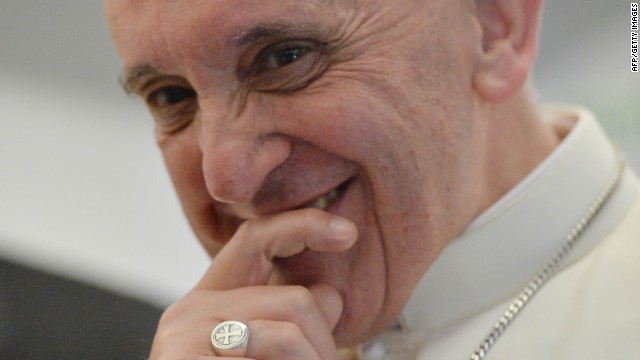
On November 22, Pope Francis gave a card, “The Beatitudes of the Bishop” to all members of the CEI (the Italian conference of bishops) meeting in Rome. The text offers encouragement and pastoral guidance not only to the Italian bishops but to the more than 5,000 Catholic bishops in the world today.
It was “an exercise in synodality”, with the gift of the “Bishop’s Beatitudes”, commented one of the prelates present at the opening session of the 75th extraordinary general assembly of the CEI. It was “a very nice and family meeting,” added the Secretary General of the CEI Stefano Russo.
Pope Francis, after being welcomed on his arrival immediately began to dialogue with the prelates. It was “a beautiful and serene dialogue”, commented another of the bishops present. Monsignor Russo explained: “On the synodal journey we live a time of listening and as always the Pope, first of all, testifies to it. He came among us and listened to the bishops who asked questions and paused for a long time in answering them. The Pope is really very attentive to our realities. In each reply to each bishop he mentioned something related to the dioceses”.
The familial atmosphere was also evident from the initial greeting of the Cardinal president of the CEI, Gualtiero Bassetti, starting with the joke – “We have not yet concluded the beauty contest” (the Hotel in which they met in fact, often hosts competitions of different types). This meeting, which ends on Thursday 25 November, can be considered to all intents and purposes the continuation of that held six months ago when the Synodal Way of the Churches in Italy was started, which will also be discussed on this occasion.
It was originally thought that Francis had written the text himself, but it later transpired that the text had been written by the archbishop of Naples, Domenico Battaglia, who first used it at the ordination of three new bishops for that diocese in a homily on Oct. 31. The pope learned about the text and made it his own by having it printed on a card and giving it to each of the Italian bishops.
The beatitudes of the bishop are challenging and very much in Francis’ style. They offer a portrait of how a pastor should be in the 21st century, in a world where there is so much poverty, injustice, conflict, suffering and human fragility. They are a call to serve and to dirty one’s hands, to wipe tears and work for justice, peace and reconciliation, to find goodness even in the worst situations and to work to build fraternity in today’s world.
These beatitudes also highlight the temptations faced by bishops, like that of seeking power and a comfortable lifestyle.

“The Beatitudes of the Bishop”
- Blessed is the bishop who makes poverty and sharing his lifestyle because with his witness he is building the kingdom of heaven
- Blessed is the bishop who does not fear to water is face with tears, so that in them can be mirrored the sorrows of the people, the labors (fatigue) of the priests, who finds in the embrace of the one who suffers the consolation of God.
- Blessed is the bishop who considers his ministry a service and not a power, making meekness his strength, giving to all the right of citizenship in his own heart, so as to inhabit the land promised to the meek.
- Blessed is the bishop who does not close himself in the palaces of government, who does not become a bureaucrat more attentive to statistics than to faces, to procedures than to people’s stories, who seeks to fight at the side of people for the dream of the justice of God because the Lord, encountered in the silence of daily prayer, will be his nourishment.
- Blessed is the bishop who has a heart for the misery of the world, who does not fear dirtying his hands with the mud of the human soul in order to find there the gold of God, who is not scandalized by the sin and fragility of the other because he is conscious of his own misery, because the look of the Risen Crucified One will be for him the seal of infinite pardon.
- Blessed is the bishop who wards off duplicity of heart, who avoids every ambiguous dynamic, who dreams good even in the midst of evil, because he will be able to enjoy the face of God, tracking it down in every puddle of the city of people.
- Blessed is the bishop that works for peace, who accompanies the paths of reconciliation, who sows in the heart of the presbyterate the seed of communion, who accompanies a divided society on the pathways of reconciliation, who takes by hand every man and every woman of good will in order to build fraternity: God will recognize him as his son.
- Blessed is the bishop who for the Gospel does not fear to go against the tide, make his face ‘hard’ like that of Christ heading to Jerusalem, without letting himself be held back by misunderstandings and by obstacles because he knows that the Kingdom of God advances in contradiction to the world.
